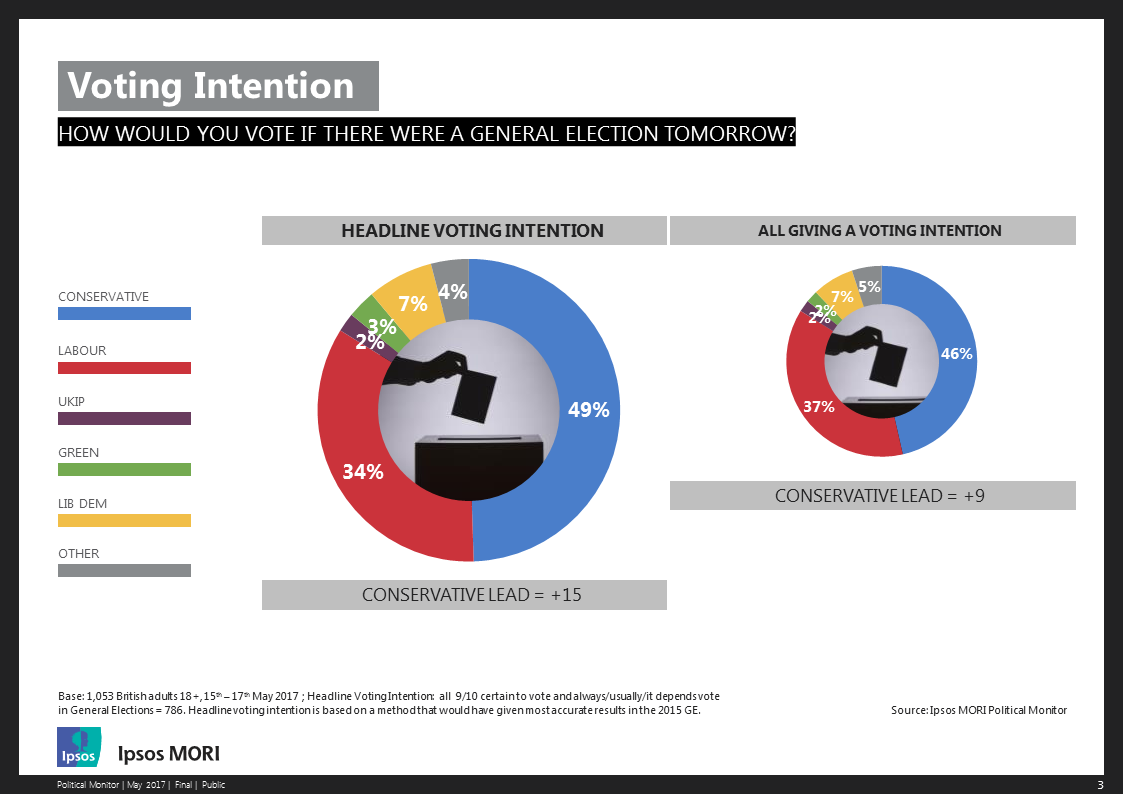Labour vote share rises – but their support is much softer than Conservatives’
Record scores for Conservatives as party with best policies, team of leaders, most clear and united
NHS and Brexit joint top issues when it comes to deciding who to vote for
CON 49 (NC); LAB 34 (+8); LIB DEM 7 (-6); UKIP 2 (-2)
With just three weeks to go until Britain goes to the polls Ipsos’s new Political Monitor shows the Conservatives holding a strong lead despite an improvement for Labour. The Conservatives currently stand on 49% (nc from April) with Labour at 34% (up 8 points), the Liberal Democrats down six to 7% and UKIP with 2%.

There is a softness in the Labour support, however, as the new poll reveals a clear party distinction when it comes to strength of support – 77% of Conservative supporters say they’ve definitely decided who they’ll vote for (22% may change their mind) compared with 57% of Labour supporters (42% may change their mind). Worryingly for Jeremy Corbyn, two in five (38%) Labour voters who may change their mind say they would consider voting for the Conservative party. Overall two in three (67%) voters say they’ve definitely decided who they’ll vote for (up 4 points from April) while one in three (32%) may change their mind.
Jeremy Corbyn has seen some improvement in his leader satisfaction ratings although the Prime Minister remains the leader with much the strongest scores. A majority (55%) say they are satisfied with Theresa May doing her job (down 1 point) and 35% say they’re dissatisfied leaving her a net satisfaction score of +20. Three in ten (31%) say they are satisfied with Mr Corbyn as opposition leader (up 4) with three in five (58%) dissatisfied giving him a net satisfaction score of -28. Amongst their own party supporters Theresa May fares better than Jeremy Corbyn with nine in ten (91%) of Conservatives satisfied with her, while three in five (58%) Labour supporters say they are satisfied with Jeremy Corbyn and 35% dissatisfied.
Tim Farron and Paul Nuttall still struggle breaking through with public. Three in ten (28%) are satisfied with the Liberal Democrat leader while two in five (39%) are dissatisfied giving him a net score of -11. One in three however say they have no opinion of Mr Farron. The UKIP leader also grapples with low public satisfaction ratings where 17% say they are satisfied with his performance with a majority (54%) dissatisfied – giving him a net score of -37 (28% say they don’t know).
When it comes to being the most capable Prime Minister the public still prefer Theresa May – 56% opting for the Conservative leader and three in ten (29%) for Jeremy Corbyn – although this has narrowed from last month when 61% picked Theresa May and 23% Jeremy Corbyn.
In spite of some improvement to Labour and Jeremy Corbyn’s polling figures, the public do not yet believe either is ready to govern. Only three in ten (30%) agree that Labour are ready to form the next government (60% disagree) while a comparable three in ten (31%) agree Jeremy Corbyn is ready to be Prime Minister (60% disagree).
Overall the Conservative party outperforms Labour on a number of key attributes according to the British public. Forty-three percent say the Conservatives have the best policies for the country as a whole compared to 31% for Labour. Majorities also think the Conservatives have the best team of leaders to deal with the country’s problems (53% vs 21% for Labour) and are most clear and united on their policies (52% vs 16%). These are the highest scores for any party since Ipsos started asking the questions in the beginning of the 1990s. Labour close the gap to the Conservatives when it comes to the party best at looking after the interests of people like you (40% say the Conservatives and 35% Labour), while are the most trusted to get the right balance between how much rich and poor people pay in tax (33% say the Conservatives and 85% Labour).
The NHS and Brexit are the joint top issues that matter most to Britons when deciding how to vote. Forty-three percent say the NHS is an important issue, climbing 12 points from April – a possible reaction to the recent cyber-attack. Brexit remains steady at 42% (no change from April) followed by education (22%), managing the economy (16%), immigration (12%), and taxation (12%). There’s been a small fall in the Ipsos Economic Optimism Index with 27% saying the economy will improve in the next twelve months (down 1) and 43% saying it will get worse (up 3) leaving an EOI score of -16 (down 4).
Gideon Skinner, Head of Political Research at Ipsos, said:
Labour shouldn’t get too carried away by the rise they see in the polls. The focus on their manifesto may have helped them this week, but on many fundamentals such as leadership the public still puts them a long way behind the Conservatives, and their vote is much softer, with one in six of their supporters considering voting for Theresa May’s party.
Technical Note:
Ipsos interviewed a representative sample of 1,053 adults aged 18+ across Great Britain. Interviews were conducted by telephone 15th-17th May 2017. Data are weighted to the profile of the population (by age, gender, region, work status/sector, social grade, car in household, child in household, tenure, education and newspaper readership).




